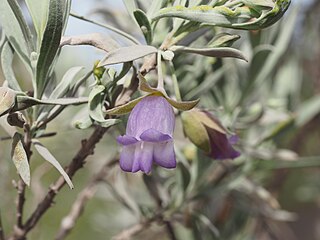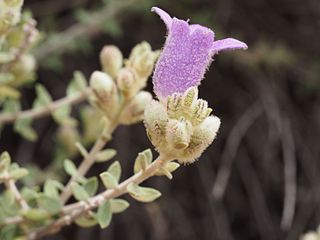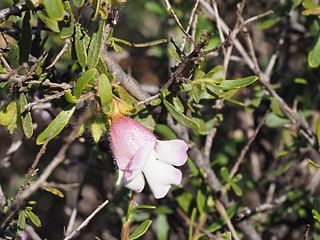
Eremophila maitlandii, commonly known as Shark Bay poverty bush, is a flowering plant in the figwort family, Scrophulariaceae and is endemic to Western Australia. It is a silvery-grey shrub with linear leaves and lilac-coloured to light purple flowers and is common in coastal areas between Shark Bay and Carnarvon.

Eremophila caespitosa, commonly known as felty-leaved eremophila, is a flowering plant in the figwort family, Scrophulariaceae and is endemic to an area near the centre of Western Australia. It is a small shrub with a tuft-like habit, very hairy grey leaves and lilac to purple flowers.
Eremophila eversa is a flowering plant in the figwort family, Scrophulariaceae and is endemic to a restricted area of Western Australia. It is known from only one plant, now thought to have died. It is a small shrub with small leaves and hairy purple to lilac-coloured flowers.

Eremophila jucunda is a flowering plant in the figwort family, Scrophulariaceae and is endemic to Western Australia. It is a small to medium-sized shrub with hairy branches and leaves, lance-shaped to egg-shaped leaves and cream-coloured, lilac or purple flowers.
Eremophila lanata is a flowering plant in the figwort family, Scrophulariaceae and is endemic to Western Australia. It is a small shrub with small, hairy leaves, densely hairy sepals and lilac to pinkish flowers.

Eremophila magnifica is a flowering plant in the figwort family, Scrophulariaceae and is endemic to Western Australia. It is an erect shrub with large, clustered leaves and large, attractive lilac-coloured or purple flowers, sometimes so densely clustered that they appear like compound heads of terminal flowers.

Eremophila malacoides, commonly known as frontage poverty bush, is a flowering plant in the figwort family, Scrophulariaceae and is endemic to Western Australia. It is a shrub with grey-green foliage, densely hairy leaves, and usually lilac to purple flowers but a yellow flowered form also occurs.

Eremophila obovata is a flowering plant in the figwort family, Scrophulariaceae and is endemic to Australia. It is a low, compact shrub with lilac to purple flowers growing mainly in the Northern Territory and Queensland but also Western Australia, South Australia and New South Wales.
Eremophila petrophila is a flowering plant in the figwort family, Scrophulariaceae and is endemic to Western Australia. It is a tall, erect, open shrub with rough branches, narrow, sticky leaves and pale lilac-coloured flowers.

Eremophila phyllopoda is a flowering plant in the figwort family, Scrophulariaceae and is endemic to Western Australia. It is an erect or spreading shrub, sometimes round or flat-topped with sticky, hairy leaves and flowers ranging in colour from pink or lilac to purple.
Eremophila pilosa is a flowering plant in the figwort family, Scrophulariaceae and is endemic to Western Australia. It is a small shrub with many tangled branches, with its leaves and branches densely covered with hairs and which has mauve or purple flowers. It occurs in a restricted area in the Pilbara.
Eremophila prolata is a flowering plant in the figwort family, Scrophulariaceae and is endemic to Western Australia. It is an erect shrub with a rounded top, prominently ridged, hairy branches, narrow leaves and white to deep lilac-coloured flowers.
Eremophila pungens is a flowering plant in the figwort family, Scrophulariaceae and is endemic to Australia. It is an erect, sticky shrub with broad, serrated-edged leaves which end in a sharp spine and purple or violet flowers.

Eremophila recurva is a flowering plant in the figwort family, Scrophulariaceae and is endemic to Australia. It is a shrub with hairy grey leaves, large grey sepals and blue, mauve or lilac flowers.
Eremophila retropila is a flowering plant in the figwort family, Scrophulariaceae and is endemic to Western Australia. It is an erect, spreading shrub with hairy, greyish leaves crowded at the ends of the branches, and lilac or violet-coloured flowers which are white inside.
Eremophila revoluta is a flowering plant in the figwort family, Scrophulariaceae and is endemic to Western Australia. It is a low, dense shrub with small, hairy leaves, very hairy sepals and mauve or purple petals.

Eremophila rigens is a flowering plant in the figwort family, Scrophulariaceae and is endemic to Western Australia. It is an erect shrub with long, stiff, glabrous leaves and pale lilac-coloured to white flowers.

Eremophila rigida is a flowering plant in the figwort family, Scrophulariaceae and is endemic to Western Australia. It is an erect, rigid shrub with thick, hairy, rigid leaves and pale yellowish-cream flowers.

Eremophila spinescens is a flowering plant in the figwort family, Scrophulariaceae and is endemic to Western Australia. It is a low, spreading, rigid, spiny shrub with small leaves and lilac to dark purple flowers.
Eremophila verrucosa is a flowering plant in the figwort family, Scrophulariaceae and is endemic to South Australia. It is an erect, broom-shaped shrub with its leaves and branches covered with yellow-grey scales and lilac to purple flowers.












